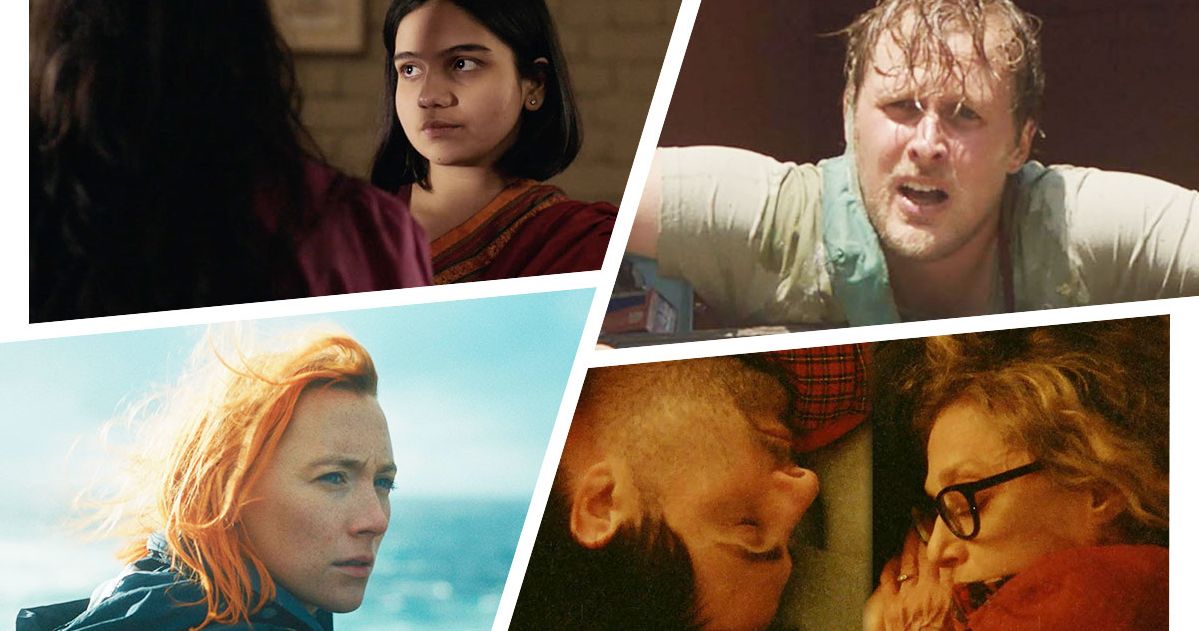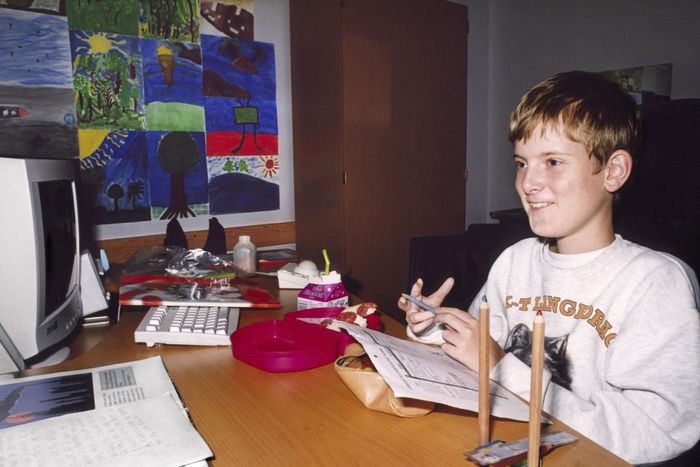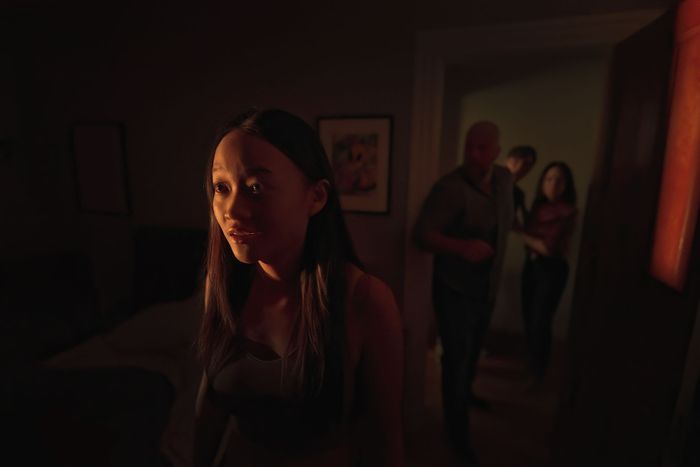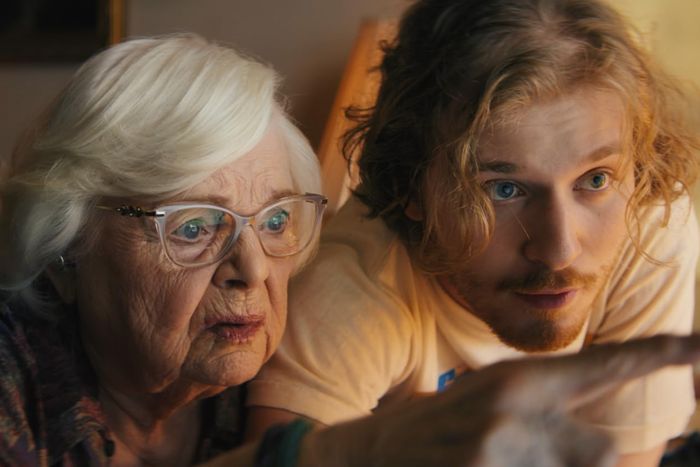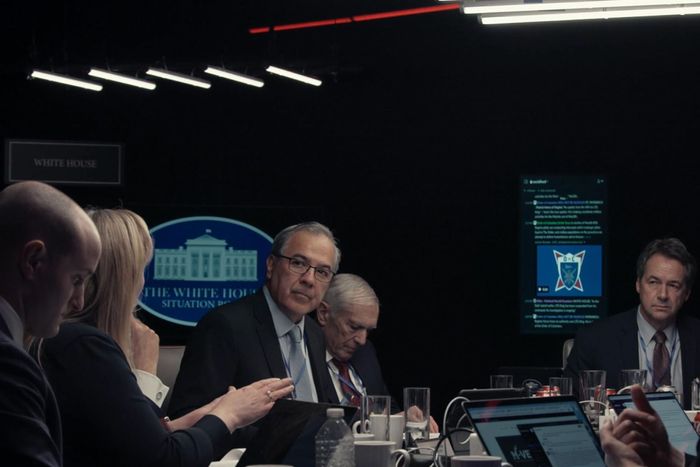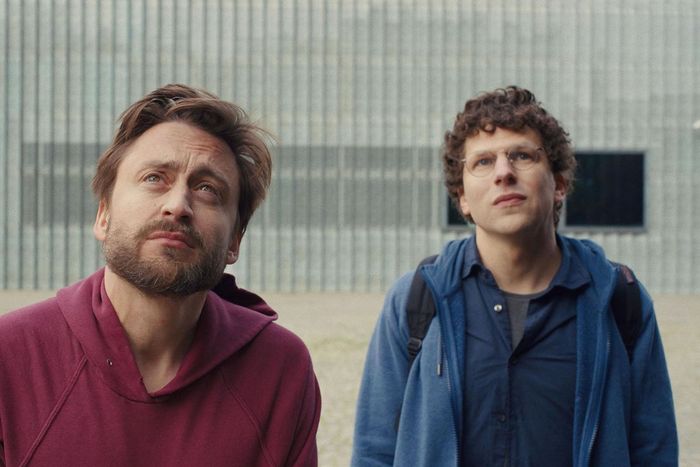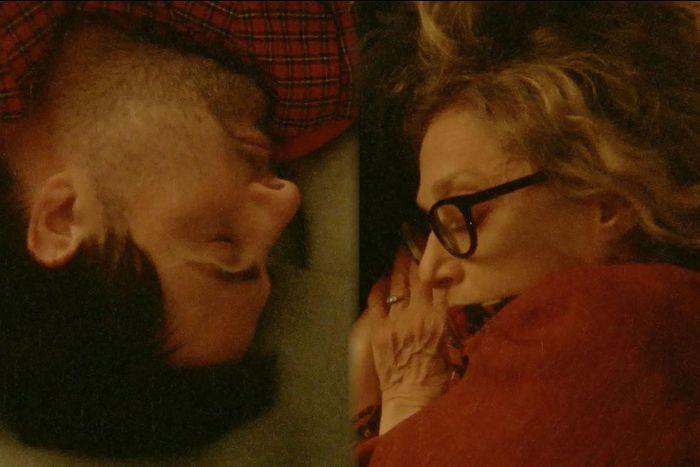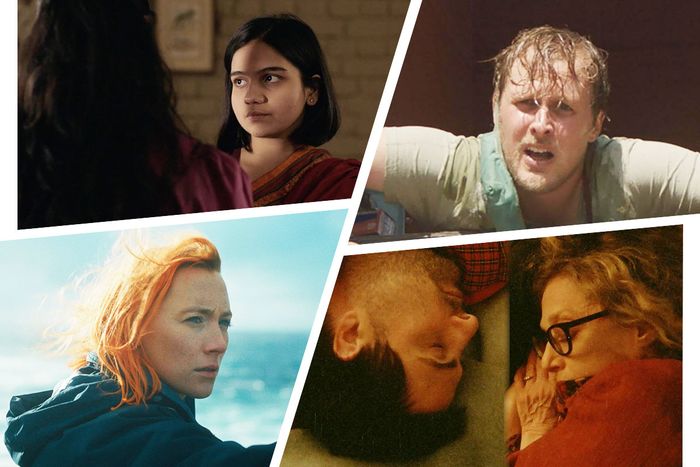
Photo-Illustration: Vulture; Photos: Cinema Inutile, Neon, Ley Line Entertainment, Protagonist Pictures
Forget the bloviating from the trades and from those concerned about the lack of big sales, this was actually one of the best Sundance lineups in years. Sure, maybe next year’s Best Picture winner wasn’t among this crew. And maybe the money wasn’t flowing as freely given the troubled distribution landscape. And maybe, after years of the festival seeking to attract bigger and bigger celebrities and potential awards contenders, the overall buzz was muted. But here was a program of genuinely independent films, including daring work from up-and-coming filmmakers and rejuvenated creativity from more established artists. The festival was observing its 40th anniversary this year, and it used that occasion to honor some of the big names that had come through over the decades. But in truth, the best way to celebrate that history was to put together a line-up of films that actually felt like Sundance, like the festival it used to be before it became just another stop on Hollywood’s eternal red carpet. We saw a lot of very good films this year. Not all of them made the final list. But here are the 14 best films we saw at Sundance this year.
Photo: Mubi
When Mats Steen died of an incurable progressive muscle disease at the age of 25 in 2014, his parents assumed that their dear son, having spent the past decade playing video games from a wheelchair in the basement of their Oslo home as his body grew weaker, had missed out on pretty much all of life. But then they discovered that Mats was a well-known and beloved member of a tightly-knit guild in World of Warcraft, where his strapping avatar, Ibelin Redmoore, had love affairs and good friends, and had even made a genuine difference in the other players’ real lives. Benjamin Ree’s enormously powerful film tells Mats’s story three different times, with each movement of the film adding new emotional details. The most notable of these is an extended animated segment that brings Ibelin’s adventures and interactions to life. Films that try to capture the qualities of virtual life often wind up unwatchable, an unpleasant hodgepodge of avatars and dodgy graphics. But the animations in Ibelin are artfully done: We feel the characters’ trepidation, and we understand that behind these awkward avatars are real people, out there somewhere, longing to connect.
Photo: Sundance
A haunted house movie from the point of view of the ghost, Steven Soderbergh’s Presence combines the director’s ongoing formalist ambitions with stripped-down, boilerplate genre theatrics. A family buys a new house, and soon, the daughter is sensing strange occurrences while the others remain oblivious. The camera (operated by the director himself) drifts through spaces, hovers around actors, races up and down stairs, and looks out windows — usually in single takes that constitute the entirety of a scene. The camera’s presence, the question of where it goes and why, and which characters it focuses on, thus all go from stylistic questions to narrative and thematic ones. The unseen figure of the ghost becomes an expression of the filmmaker’s power over the frame, evoking the sadistic-voyeuristic nature of cinema in general and genre cinema in particular. The result is an art film that also works as a spellbinding horror film, and it might be the best thing Soderbergh has done in ages.
Photo: Protagonist Pictures
Saoirse Ronan gives one of her most transcendent performances in Nora Fingscheidt’s windswept drama as a woman trying to rebuild her life after returning to her childhood home in the Orkney Islands. The film, based on Amy Liptrot’s 2016 memoir of addiction and recovery, drifts back and forth between its protagonist’s present and her past as an out-of-control alcoholic in London. It also hops along different periods in her rehabilitation, never quite following a clean and steady narrative line, which puts quite a bit of responsibility on Ronan’s performance. We chart her character’s progression through her eyes and her physicality. Interwoven throughout are the protagonist’s observations about life in the region, its myths, its flora and fauna, presented via voice-over, archival footage, snapshots, and even animated passages. It all speaks to the fundamental helplessness of humans in the midst of nature, but it also hints at a fantasy of power: If another being can exert such command over our worlds, then so perhaps can we. That idea — full of tension, frustration, possibility — fuels the whole film, and Ronan’s performance specifically.
Photo: Zurich Avenue
A 94-year-old woman goes on a quest to locate the crooks who scammed her out of $10,000. That sounds like the set-up to a bad one-joke old-person-does-thing comedy, but Josh Margolin’s film manages to be so charming and heartfelt that the laughs never feel lazy, cheap, or cruel. Its observations about the disconnect between its elderly protagonist (played by a marvelous June Squibb, also 94) and the society around her are surprisingly relatable. Helping our heroine on her quest is a fellow retiree, played by Richard Roundtree, getting a chance to show his range in his final role. While the movie generates clever, inoffensive fun from assorted elderly challenges, and shoots seemingly simple tasks with the verve of a Mission: Impossible movie, where it truly shines is in its depiction of a world that spins ever forward while the rest of us — all of us — are left confused in its wake.
Photo: Matador Content
On January 6, 2023, a group of former politicians and officials from America’s military and intelligence services convened to role-play what the country’s next insurrection might look like. The simulation was set on January 6, 2025, but it was designed to look like January 6, 2021 on steroids. A political thriller in documentary form, Jesse Moss and Tony Gerber’s War Game shows us the breathless back and forth of the fictional President and his fictional advisers (many of them played by real policy makers), the constant news “updates” (from a mock television channel created for the occasion), as well as the pretend insurrection leaders working overtime to inflame the situation. But War Game’s most powerful moments come when it steps back from the events of this particular day to tell us more about some of the actual people involved. It does also raise some troubling questions: Is this group of thoughtful moderate democrats and principled conservatives speaking to anybody but themselves? Can the war game, played mostly by people who are out of power, really help anyone prepare for whatever insanity lies ahead of us? The simulation may end, but the tension never unwinds.
Photo: Searchlight
A touching character study anchored by a lively Kieran Culkin performance, Jesse Eisenberg’s A Real Pain follows two temperamentally different cousins on a Holocaust tour through modern-day Poland. We watch them bicker and bond as they visit war memorials, cemeteries, and the Majdanek concentration camp, and it might feel odd to see gentle comedy play out against a backdrop of such grim locations. But that’s also partly the point of the movie. It’s about how we can live in a world of infinite evil and madness and still make it through the day — how we “ignore the proverbial slaughterhouse to enjoy the steaks,” as one character puts it. The film’s pleasant surfaces and soft rhythms, set to several familiar Chopin pieces, embody the dissonance surrounding the characters. They wander through a modern world in which they see only small glimpses of the past. The places they visit are not unlike people in general: it’s not always easy to see what darkness they harbor.
Working on the orders of the King of Bhutan, the country created a “happiness index” to gauge its citizens’ relative happiness according to a series of parameters. Then it hired 75 workers to go around the nation interviewing people about what their lives are like, and to assign them happiness levels. Arun Bhattarai and Dorottya Zurbó’s mesmerizing and gorgeously shot documentary follows two of these agents as they drive around the Himalayas talking to people about their hopes, dreams, fears, struggles, and how much livestock and/or transportation methods they have. Perhaps needless to say, happiness turns out to be a complex, ever-changing thing. What’s more, one of these agents of happiness, Amber, is himself struggling with the concept. He’s entering middle age, takes care of his frail mother, wants to find a wife, and is wondering what he’s going to do with his life. What’s more, his family was stripped of citizenship in the ’90s, which means he can’t get a passport or leave the country. The filmmakers’ patient, compassionate gaze allows all these people to speak for themselves. In so doing, they prompt us to take account of our own lives.
In this remarkably tender, intelligent coming of age picture from Indian director Shuchi Talati, star student and high school senior Mira (Preeti Panigrahi) wrestles with her newfound responsibilities as her elite boarding school’s Head Prefect while trying to navigate the stirrings of first love with the handsome, worldly, and flirty new boy in class, Srinivas (Kesav Binoy Kiron). The deferential Srinivas always seems to know the right things to say, and his charm even captivates Mira’s mom (played by the wonderful Kani Kusruti), who begins conspiring with her daughter to bring the boy over to their house for study sessions. The movie could at any given point go in any number of horrible and melodramatic directions, but the filmmakers bring depth and observational honesty to these characters and situations. The result is a riveting and complex drama about mothers, daughters, the stirrings of romance, the vulnerability of youth, and the crushing power of institutions.
We’ve seen any number of movies about grief and the healing power of art, but we’ve never really seen anything like this. Dan (Keith Kupferer), an easily distracted, sad-sack construction worker with a hot temper, finds himself invited to join a rag-tag community theater group that’s putting on a small production of Romeo and Juliet. As we learn more about the source of his sadness and rage — and the overwhelming heartbreak his family is dealing with — an almost surreal resonance emerges between real life and Shakespeare’s play. Unbelievably well-acted by Kupferer, his wife Tara Mellon, and their daughter Katherine Mallen Kupferer, Kelly O’Sullivan and Alex Thompson’s film begins in understated fashion and eventually works up such an intense head of steam that you’re liable to find yourself scream-crying throughout its final act.
Carla Gutierrez’s documentary about Frida Kahlo uses the legendary painter’s own words — taken from interviews, letters, and journals — to create a voiceover that guides us through her life. Even more astonishingly, Gutierrez also takes Kahlo’s artwork, her paintings and images from her visual diaries, and animates them to evoke Frida’s emotional journey. This is not a talking heads doc or a dry study of a great artist’s career. Rather, it’s an intimate look at what it must have felt like to be Frida Kahlo, and more than any previous cinematic depiction of her life and career (of which there have been quite a few), this film makes us feel like we really know her. Some will see its use of animation as a desecration of Frida’s art, but here it makes perfect sense, and serves an expressive purpose. Frida is about how the art was always evoking the joy, anxiety, fear, pain, and rage of the human behind it.
Writer-director Theda Hammel did the impossible in her first-time feature, Stress Positions: She made a COVID comedy that actually works! This Brooklynite farce stars John Early as Terry Goon, an aging millennial self-isolating in a former party house owned by his estranged husband, played by a perfectly slimy John Roberts (Linda from Bob’s Burgers!!). The lockdown setting allows Early to do what he does best, which is hyper-specific physical comedy. This character’s stress-levels are at a ten from the beginning and only ramp up to like a twenty; basic tasks seem like they would already be harder-than-necessary for poor Terry, even if it wasn’t spring 2020 and he wasn’t trying to take care of his 19-year-old model nephew Bahlul (Palestinian model Qaher Harhash), who is crashing in his basement with a broken leg. He putters around, Lysoling a five-dollar bill to tip GrubHub delivery dude Ronald (Faheem Ali, with a co-writing credit) and throwing out his back slipping on chicken in the kitchen. Beyond Early’s character-driven slapstick, the writing is a perfectly poisonous send-up of the ways a certain species of queer coastal millennial talks about themselves, others, and issues beyond their grasp. If you like Hammel’s podcast Nymphowars, you’ll appreciate the chaotic frequency this comedy vibrates on.
Photo: Ley Line Entertainment
Indie filmmaker Nathan Silver submitted 13 films to Sundance over the years before he finally got one in. And maybe that’s beshert, because his intimate, offbeat comedy Between the Temples feels really welcome in this exact moment, once the midwinter despair has seeped in. This is a film about listening and being listened to, and Sean Price Williams puts leads Jason Schwartzman and Carol Kane in extreme, grainy close-ups, showing us how happy they are to talk to each other for hours, forever. He’s a cantor who’s lost his voice from grief and she’s his former music teacher, entreating him to tutor her for the Bat Mitzvah she never had as a child. There are stunning supporting performances from Madeline Weinstein in a breakout role and Dolly de Leon as a judgy, overzealous convert realtor married to Caroline Aaron (big-brained casting move). Best of all are the very funny throwaway lines and the details of these characters’ lives, like Robert Smigel as a rabbi with a “TKN OLM” license plate who practices his putting by tapping a golf ball into a shofar.
Sean Wang’s debut feature deserves every single accolade that comes its way, and I really believe the awards it won at Sundance (the Audience Award along with Special Jury Award: Ensemble) are only the beginning for this excellent coming-of-age film. Didi is a 2008 period piece starring the very loveable Izaac Wang as Chris, a Taiwanese-American 13-year-old spending the summer before high school in his Bay Area suburb filming skate tricks on a digital camera, texting his crush on a Motorola Razr, and desperately, agonizingly trying to fit in with others and feel comfortable in his own skin … with sometimes funny, sometimes ruinous results. Your heart breaks for him as he gets called “pretty cute … for an Asian” or finds that he’s been booted from his best friend’s Myspace Top 8. Your heart breaks ten times over when he fights with his mother, played by Joan Chen (Oscar campaign starts NOW). It breaks a hundred times over when they make up. Didi has all the loose, goofy humor of PEN15 and the empathetic cringe of Eighth Grade, with Wang’s fresh, deeply personal perspective setting it apart. Plus, it’s got the festival’s best soundtrack (a new song by Motion City Soundtrack included) and the festival’s best cameo: SmarterChild!
Photo: A24
I Saw the TV Glow comes from Jane Schoenbrun, who in 2021 directed the haunting, semi-opaque We’re All Going to the World’s Fair, a film about a lonesome teenage girl creating videos as part of an online horror challenge. I Saw the TV Glow, which just premiered at Sundance, will be released by A24 and is a much sleeker production with familiar actors, cameos from Phoebe Bridgers and Buffy’s Amber Benson, and a lush suburban-gothic aesthetic that periodically gives way to a pitch-perfect lower-resolution recreation of a ’90s television series. But the films are very much of a kind thematically, as explorations of isolation and connecting through screens, and as works about transness — Schoenbrun started working on I Saw the TV Glow early in their own transition, not long after beginning hormone therapy. What’s exciting about Schoenbrun’s work is that it feels as though they’re working things out as they go through their films, and that’s an excellent reason to keep watching.

